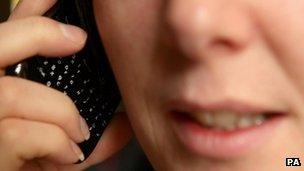Costly government phone lines criticised by watchdog
- Published

Callers would save money if government helplines switched to 03-prefixed numbers, Ofcom said
Higher rate government phone lines cost callers £56m last year, the National Audit Office has revealed.
An investigation by the public spending watchdog found that 084-prefixed numbers continue to be used "extensively" across Whitehall.
People on low incomes, who are more likely to use pay-as-you-go mobiles, were worst hit by the charges, it said.
The government pledged to "address the issues raised by the NAO" while "protecting vulnerable groups".
About one third of central government helplines incur higher-rate charges but account for 63% of the calls made to government, the National Audit Office (NAO) said.
Average landline call costs to standard geographic numbers and those that begin 03 cost around 3.4p per minute and 1.1p from mobile phones.
This rises to 5.6p from landlines for 0844 numbers - and 17.1p from a mobile phone.
The NAO estimated that the value of callers' waiting time was about £100m. Its sample also found that 4% of local authority phone lines and 8% of GP surgeries were using 084 numbers.
'Eye-watering'
NAO head Amyas Morse said: "Callers do not receive a better service from higher rate numbers and many callers are put off calling government phone numbers altogether. The most vulnerable callers, such as low-income households, face some of the highest charges.
"Each department needs to take a clear approach to using higher rate numbers and protecting vulnerable callers, and improve their understanding of how to get the best value from telephone services for both callers and taxpayers."
Labour MP Margaret Hodge, who chairs the Commons Public Accounts Committee, added: "It is not acceptable that vulnerable people are facing some of the highest charges to call central government about important issues such as benefits and redundancy.
"Call charges are complicated and difficult for callers to understand. Charges to higher rate numbers are greatest from pay-as-you-go mobile phones, relied on heavily by low income and vulnerable households. In its proposed reforms, Ofcom needs to get to grips with this confusing charging system.
"Higher rate telephone numbers across central government cost callers an eye-watering £56m in 2012-13."
'Straightforward and convenient'
She added: "Departments do not have consistent policies for charging for their telephone services, and the Cabinet Office no longer monitors charges.
"The Cabinet Office needs to step up and set guidance for departments so they can focus on minimising the costs of providing telephone lines for the taxpayer and user.
"Changing all higher rate numbers to cheaper 03 numbers would save callers £29m a year, at an annual cost to government of only £7m."
A spokesman for communications watchdog Ofcom said: "Ofcom has announced detailed plans to make the charging system much clearer for all non-geographic numbers, such as those beginning 08. We expect to finalise those measures in the autumn.
"We also actively encourage public bodies to use 03 numbers, as these cost no more to call than a normal geographic number."
A spokeswoman for the Cabinet Office said: "The Government Digital Strategy sets out how government will re-design its digital services to make them so straightforward and convenient that all those who can use them will choose to do so, whilst assisted digital support is being developed so that those who cannot are not excluded, protecting vulnerable groups in particular.
"In the past, government has not been joined up in reviewing the use of paid-for numbers, so a more coordinated approach is required. Where possible, we should use government's unique buying power to negotiate the best deal for the taxpayer.
"Hard-working families would expect us to address the issues raised by the NAO and we will do so."
But a Labour spokesman argued: "This is yet more proof that this is a government that stands up for the wrong people. While millionaires get a tax cut, ordinary people are getting ripped off, paying millions to access government phonelines."
- Published18 May 2013
- Published18 December 2012
- Published21 June 2012